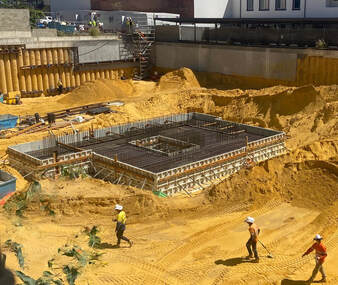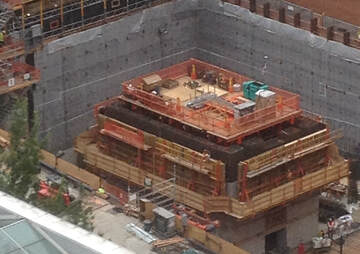"Winning new construction work does not stop when the contractor submits their price" In our last articles we discussed how important it was for contractors to ensure that their construction prices or quotations were correct and presented in a professional manner to give the contractor the best chance of winning a new construction project. Steps to help you win your next construction project, and Your tender submission or quotation – Get it right But having a good price and a professional presentation is only part of the job and the contractor often has to do some more work to win the construction project. Often after receiving prices for their construction project (tenders, bids or quotations) clients/owners talk to some of the contractors who submitted a price. These discussions can impact whether the contractor wins or loses the project. But also, mistakes at this stage may cost the contractor dearly when they are awarded the project. These discussions may be in the form of written correspondence, or may involve formal meetings with the contractors. "there are several reasons clients want to talk to a contractor after reviewing their project price. And it's not always just to get a discount!" Why clients talk to contractors after receiving their quotationWhy are there discussions Usually the discussions are initiated because: 1. The client has queries about the contractor’s price and what’s included. 2. The client wants to ensure the contractor understands the project and has the resources and skills to do the project. 3. The client has made changes to the original project pricing documents or tender documents and requires contractors to revise their price. 4. The contractor has included conditions in their price which the client doesn’t want to accept "Just because the client is talking to you does not mean the project is in the bag!" The fact that the owner/client is talking to the contractor may indicate that they are interested in the contractor's price. However, in some cases they may be talking to all those who submitted a price - particularly if they have made changes that require contractors to update their price. Dealing with communications after your construction price is submittedYou should have included contact details in your tender of the person who the client should contact when they have questions. Obviously, ensure that person will be available to answer correspondence or at least provided secondary contact details. We often had to submit prices just before closing for the industry break. Clients however are usually in a hurry to get answers and don’t respect these breaks. Correspondence that goes unanswered will probably end any further interest in your price. "Answers may not be immediately available. Don't be rushed but keep the client informed" It is essential questions are handled and coordinated by one person in the contractor’s office. Failure to do this may result in the client receiving conflicting answers or perhaps not receiving any answers when there’s a mix-up between the contractor’s personnel. Often Clients expect an answer straight away, while the contractor may have to contact subcontractors and suppliers for answers and sometimes do extensive recalculations. You may have to ask for more time, or if the client won’t grant this, make sure that they understand this is an estimate, and then follow up when the correct information immediately it’s available. Guidelines for answering questions about your project price"Ensure the total contract price is revised to include all the agreed changes and additions" When the client asks questions relating to the price or quotation ensure answers: 1. address these questions 2. have taken into account all of the impacts, which may include changes to the schedule, increased costs, additional overheads, delayed access, extra mobilisation costs and impacts on the rest of the project (for example, even what appears to be a small change in specification could have a major impact on the schedule if an item has to now be imported) Mistakes that impact construction schedules/programmes 3. are provided on time 4. are unambiguous and clearly state what’s included and what’s excluded 5. take into account previous responses 6. are framed in a positive manner (It’s easy to say you can’t do something, but the client won’t be happy with the answer. If you really can’t, then offer alternative solutions or explain why it’s not possible.) 7. highlight reasons for some answers, where necessary 8. offer alternative solutions where the contractor is unable to comply with the client’s requests 9. provide a revised total price which includes the effects of previous answers (Not doing this got our company into trouble on one project as the client awarded the project on the total price in the last submitted answer, assuming this price included all of the previous adjustments and answers the company had provided. However this price only took into account some of these adjustments.) 10. are sent in a formal letter (if an answer is provided verbally in a meeting it should be followed by a letter) addressed to the client’s nominated representative 11. refer back to the original tender documents, terms and conditions, and exclusions and qualifications 12. are carefully thought through 13. are filed in the tender file, together with the supporting calculations and information, so that it’s possible at a later stage to understand how the revised tender sum was arrived at I had one project where we couldn’t find any calculations relating to how the original project was priced or how it had been reduced to the final price in the contract. They were obviously done on a scrap piece of paper and discarded. I might add that the difference was worth several million dollars and nobody could tell me how the new price was arrived at. Unfortunately, sometimes the questions are sent several weeks, or months, after quotations or tenders are submitted and the Estimator has moved on to pricing other construction projects. It’s important the Estimator takes time to analyse and answer the question, referring to, and reading the original quotation or price submission to refresh their memory. Failure to do so can result in costly errors. "Consult subcontractors when changes and additions to the project or contract conditions will impact them." It’s essential when subcontractors or suppliers could be affected by these questions that they are consulted to allow them to modify their prices if necessary. Nonetheless, they do need to understand this mustn’t be treated as an opportunity to add money to their quote without reason, making the contractor’s quoted price too expensive. The fact that the client is talking to the contractor should be kept confidential so the other contractors don’t hear of this. If they know the client is talking to you they may come up with a strategy to ensure they are viewed more favourably. Any subcontractors or suppliers involved in these questions should be cautioned to keep them confidential. Take care answering questions relating to your project price"a carelessly answered question could lose the construction project or cost the contractor later" Frequently contractors are rushed in replying to questions about their project price or quotation posed by the client. They may be distracted by other bids they are working on. This can lead to them misunderstanding the questions, perhaps making a mistake with their calculation, or not given the required attention to their reply. After all your efforts in preparing and submitting your project price you wouldn’t want to let the opportunity of winning the construction project slip through your fingers because of a carelessly answered question. But a carelessly answered question could also cost the company dearly later when the costs are higher than anticipated in the answer. #pricingconstructionprojects #constructionmanagement #constructionquotations In my next articles I'll consider post bid meetings and negotiations. Construction bid clarification and negotiation meetings, and Construction project bid negotiations – Don’t make a mistake For similar articles read: Steps to help you win your next construction project Don’t make a mistake when you price your next construction project Tender submission or quotation – Get it right © 2022 This article is not to be reproduced for commercial purposes without written permission from the author. (Written by Paul Netscher the author of the acclaimed books ‘Successful Construction Project Management: The Practical Guide’ and ‘Building a Successful Construction Company: The Practical Guide’. Both books are available in paperback and e-book from Amazon and other retail outlets. This article is adapted from information included in these books.
construction management construction project management
2 Comments
Frank Ellison
22/7/2015 01:21:09 am
OBVIOUSLY ! Your company does not operate a Quality Management System, or if so, it's quite inadequate.
Reply
18/4/2018 06:07:37 am
yeah this post is actually good and I have learned
Reply
Leave a Reply. |
Archives
June 2024
Note: We welcome genuine comments, especially comments that add additional information to the subject matter in the article. We however reserve the right to remove inappropriate comments, which includes comments that have nothing to do with the subject, comments that include inappropriate language, and comments that are an advertisement for a product or company, or which include an advertising link. Comments must be in English. We will not enter into discussion on why a particular comment was removed.
CategoriesCopyright 2016 - The attached articles cannot be reproduced for commercial purposes without the consent of the author.
The opinions expressed in the attached articles are those of the writer. It should be noted that projects are varied and different laws and restrictions apply which depend on the location of the contractor and the project. It's important that the reader uses the supplied information taking cognisance of their particular circumstances. The writer assumes no responsibility or liability for any loss of any kind arising from the reader using the information or advice contained herein. "I have what I consider some of the best books on construction management."
Books are available from: Amazon.com Amazon.co.uk takealot.com kalahari.com Amazon.in Amazon.de Amazon.fr Amazon.it Amazon.com.au Powell's Fishpond uread bokus Amazon.ca Amazon.es Other retail stores Available in paperback or on Kindle "28 YEARS OF CONSTRUCTION PROJECT MANAGEMENT EXPERIENCE, DEVELOPING SUCCESSFUL CONSTRUCTION PROJECT MANAGERS AND BUILDING SUCCESSFUL CONSTRUCTION COMPANIES"
|








 RSS Feed
RSS Feed




